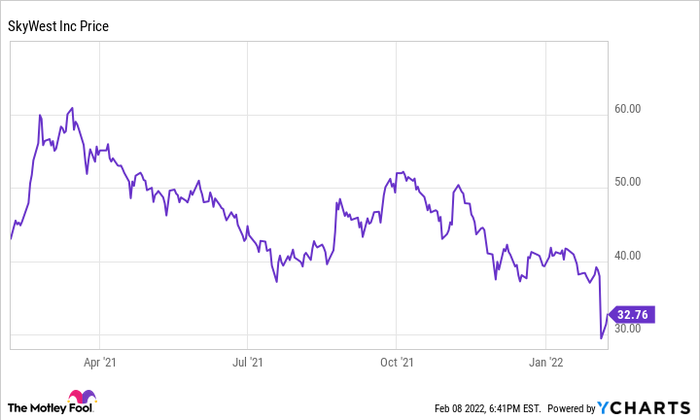Regional airline SkyWest(NASDAQ: SKYW) achieved some of the best results in the U.S. airline industry last year. The company earned a solid profit of $112 million ($2.20 per share) under generally accepted accounting principles (GAAP). On an adjusted basis -- excluding the net benefit of the federal airline payroll support programs and a one-time impairment charge -- SkyWest roughly broke even, whereas most airlines recorded big losses.
Nevertheless, SkyWest stock has lost about a quarter of its value over the past 12 months. The largest part of that decline came last Friday, when the stock plummeted 22% after management provided a disappointing forecast for 2022. While the share price has recovered a bit this week, the sharp pullback has made this airline stock a great buy now for long-term investors.
SkyWest stock performance, data by YCharts.
A solid recovery in 2021
During 2021, SkyWest capitalized on its core fixed-fee business model, which allowed it to recover quickly from the worst of the pandemic's impact on travel. Under its fixed-fee contracts, SkyWest's major airline partners pay the regional airline a flat rate (plus certain performance-related incentives) to operate particular flights for them. As such, the profitability of those flights doesn't depend on how full SkyWest's planes are or what fares passengers paid. This insulation from demand fluctuations has been a big advantage over the past two years.
Adding to its recovery momentum, SkyWest has been aggressively expanding its fleet of Embraer E175 jets in recent years. The E175 is the preferred regional aircraft in the U.S. airline industry today, and generates more revenue per block hour than other regional jets (especially smaller, 50-seat jets). SkyWest grew its E175 fleet from 156 aircraft as of the end of 2019 to 193 by the beginning of 2021.
As a result, SkyWest generated revenues of $777 million last quarter -- up 4.5% from the $744 million it brought in during the fourth quarter of 2019 -- even though it reduced total block hours by 5.3% compared to Q4 2019. Generating more revenue per hour is a potent formula for posting strong earnings as aircraft utilization returns to normal levels over the next few years.
Expecting a setback in 2022
In October, SkyWest management provided informal guidance for 2022, saying that it expected to fully offset the loss of payroll support grants with better core performance. That implied full-year earnings per share of roughly $3 to $4.

Image source: SkyWest.
However, on SkyWest's recent earnings call, management shocked investors by saying that the company was on track for roughly break-even results in 2022. While this new forecast appears conservative, it's clear that the outlook for this year has worsened dramatically over the past few months.
The big change is that pilot staffing constraints will likely force SkyWest to reduce block hours by 10% to 15% compared to 2021. Without this shortage of pilots -- and particularly, captains -- it presumably would have increased its flight schedule this year. After all, SkyWest is continuing to expand its fleet, with plans to put 46 new E175s into service during 2022.
Thus, aircraft utilization will take a step backward this year, and revenue will likely decline. That will have a severe negative impact on profitability.
What's really going on here?
Regional airline pilots have been quitting in increasing numbers for years. A growing wave of mandatory pilot retirements at mainline carriers -- which pay far more than the regional airlines -- has created lots of lucrative job openings.
SkyWest's management had already been preparing for higher attrition in staff as larger airlines accelerated their own hiring to recover from the pandemic. It has been hiring more than enough new pilots to replace those who leave.

Image source: Getty Images.
However, in recent months, captains have accounted for about 75% of the attrition. In the past, pilot attrition was typically split about 50-50 between captains and first officers. This shift has created an imbalance between captains and first officers. Management estimates that it will take at least a full year to correct that imbalance, due to the time and resources required to train current first officers so they can upgrade to the captain's seat. That will force SkyWest to reduce its flying through early 2023.
Investors overreacted
SkyWest's guidance cut was certainly disappointing. But prior to the recent earnings report, the stock already traded at a very low valuation compared to its pre-pandemic earnings power. The stock price effectively incorporated a big discount to account for risks related to the pilot shortage.
Despite the temporary headwinds, SkyWest remains one of the most desirable places to work in the regional airline industry, according to Glassdoor ratings. That should help it recruit enough pilots to more than offset the attrition it's experiencing. By 2024 (if not a few quarters earlier), SkyWest should be able to ramp up its aircraft utilization to pre-pandemic levels. At that time, it will have at least 240 high-margin E175s in its fleet -- more than 50% more than it had in 2019.
As a result, SkyWest's earnings could recover rapidly in 2023 and 2024. That makes the stock's recent slide a great buying opportunity.
10 stocks we like better than SkyWest
When our award-winning analyst team has a stock tip, it can pay to listen. After all, the newsletter they have run for over a decade, Motley Fool Stock Advisor, has tripled the market.*
They just revealed what they believe are the ten best stocks for investors to buy right now... and SkyWest wasn't one of them! That's right -- they think these 10 stocks are even better buys.
*Stock Advisor returns as of January 20, 2022
Adam Levine-Weinberg owns Delta Air Lines and SkyWest. The Motley Fool recommends Delta Air Lines. The Motley Fool has a disclosure policy.

